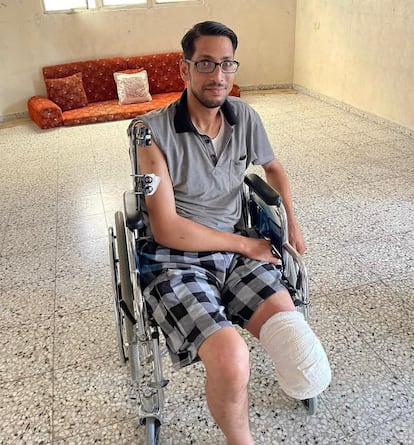“Israel forcibly deprived us of joy”: the 'dabkeh' dance, from the stages to the rubble of Gaza

In mid-2024, Mohammed Jawad, 41, woke up in a hospital in northern Gaza wanting to move his left foot. He had been wounded in a bombing weeks earlier, and his health had deteriorated due to a lack of care and medication. He struggled to understand that doctors had had to amputate his limb to save his life. “I felt like I had lost myself,” he told this newspaper.
Jawad has danced dabkeh for half his life. More than a traditional folk dance, it was his livelihood, because he taught others, his passion, and a way to joyfully reclaim his identity. In May 2024, his life took a dramatic turn. This father was participating in a cultural activity with other children in the Jabalia refugee camp in northern Gaza. As he was leaving, an Israeli attack injured his right hand and left foot. He was taken to Kamal Adwan Hospital, but Israeli forces surrounded the hospital and prevented the entry of medicine, food, and water, causing his health to deteriorate. He was later transferred to Al Maamadani Hospital, also in the north, where again the lack of medicine and medical personnel prevented his recovery. Finally, his foot became gangrenous and had to be amputated .
The ' dabkeh' is the voice of the land we live on and the joy we carry despite all circumstances
Shahad Shamali, dancer
“I woke up and didn’t know what had happened. I started to feel like I couldn’t move it, I was shocked, in a spiral of depression and denial. I couldn’t accept that my job and my passion, dabkeh , had ended,” he explains to this newspaper.

For months, Jawad isolated himself and sank into a deep sadness. He tried to get a prosthetic leg inside Gaza, but the ones he could find were very rudimentary, and he couldn't walk with them. “I just want to go back and dance again. Dabkeh gives me energy and psychological comfort; it keeps me going,” he says. “I felt a great inner joy when I saw people's faces when we went on stage,” he explains.
This traditional Palestinian dance has been part of UNESCO's Intangible Cultural Heritage list since 2023 for being "a means of expressing cultural identity." The dance, performed in a line or semicircle with the dancers intertwined and making resounding footsteps, is very typical at Palestinian weddings, parties, and celebrations.
In these two years of bombing and devastation, the dabkeh did not stop in Gaza; it continued to be danced in camps for displaced people and was used as an activity to distract children who had lost everything. According to the dancers, it transformed into an act of reclaiming identity and finding joy in adversity.
“I hope that, together with all the members of the dance company, we can one day leave here and represent Palestine and the suffering of Gaza to the world,” Jawad says.
Direct attack on cultureGazan cultural policy expert Butheina Hamdan has counted at least 21 professional Gazan dabkeh dancers killed in Israeli attacks since October 2023, and many more who have suffered amputations or other disabilities. In addition, seven company headquarters were completely destroyed, along with artistic and cultural archives documenting more than 40 years of the dance's history.
“These are not collateral damages, but a direct attack on culture and heritage. The dabkeh troupes were on the front line of defense of Palestinian identity,” he explains.
These are not collateral damages, but a direct attack on culture and heritage
Butheina Hamdan, Palestinian cultural expert
Abeer al Sourani, coordinator of Unity Academy, a Gazan cultural institution dedicated to preserving Palestinian folk traditions, had 1,000 dabkeh students two years ago. She still remembers the beloved concerts they organized before October 2023. “We wanted it to be more than just dance,” she recalls. The impact of the war is devastating: the group was scattered; some managed to leave the Gaza Strip, while others lost many family members and are morally broken. The situation doesn't even allow them to consider resuming activities.
Shahad Shamali, 20, hasn't danced dabkeh for two years. This Gazan woman was part of the Watan artistic troupe and practiced this traditional dance for 10 years.
“Israel forcibly deprived us of joy,” she summarizes. “The war robbed us of great opportunities. We were about to represent Palestine in several countries around the world, to show people our identity and heritage,” she laments.
The young woman remains silent for a moment and tries to regain her composure. “But this tragedy will not take away our determination, it will not break our dreams,” she says.
“When we go on stage and perform the same steps to the same rhythm, we feel a great power and an indescribable connection. Dabkeh is the voice of the land we live on and the joy we carry despite all circumstances,” he adds.
Khalil Tafesh, 42, has been dancing dabkeh for 28 years. This Gazan founded the Phoenix Arts Troupe, which existed for 12 years before an Israeli bombing of its headquarters, the Said al Mishal Cultural and Scientific Foundation, in 2018 brought it to a halt. In 2020, he created the Shadows arts company, but bombs once again ruined his plans. The group members scattered; one was killed and another wounded. In December 2023, his house was also bombed. “Now I only have the clothes I’m wearing. I lost all my photos and files. We own nothing, literally,” he tells this newspaper.
But even so, along with other members of the company, he has been organizing dabkeh activities and courses in the displaced persons camps of the Gaza Strip. It is “the identity of our ancestors, but also that of our children,” he says.
EL PAÍS





